
50% Off Our Old Packaging – Same Fresh Hay, Just a New Look Coming Soon!
For a limited time, all hay products are 50% off. Fresh, nutritious, and perfect for rabbits, guinea pigs, and more!

For a limited time, all hay products are 50% off. Fresh, nutritious, and perfect for rabbits, guinea pigs, and more!
Stay in the loop on NEW products and deals!
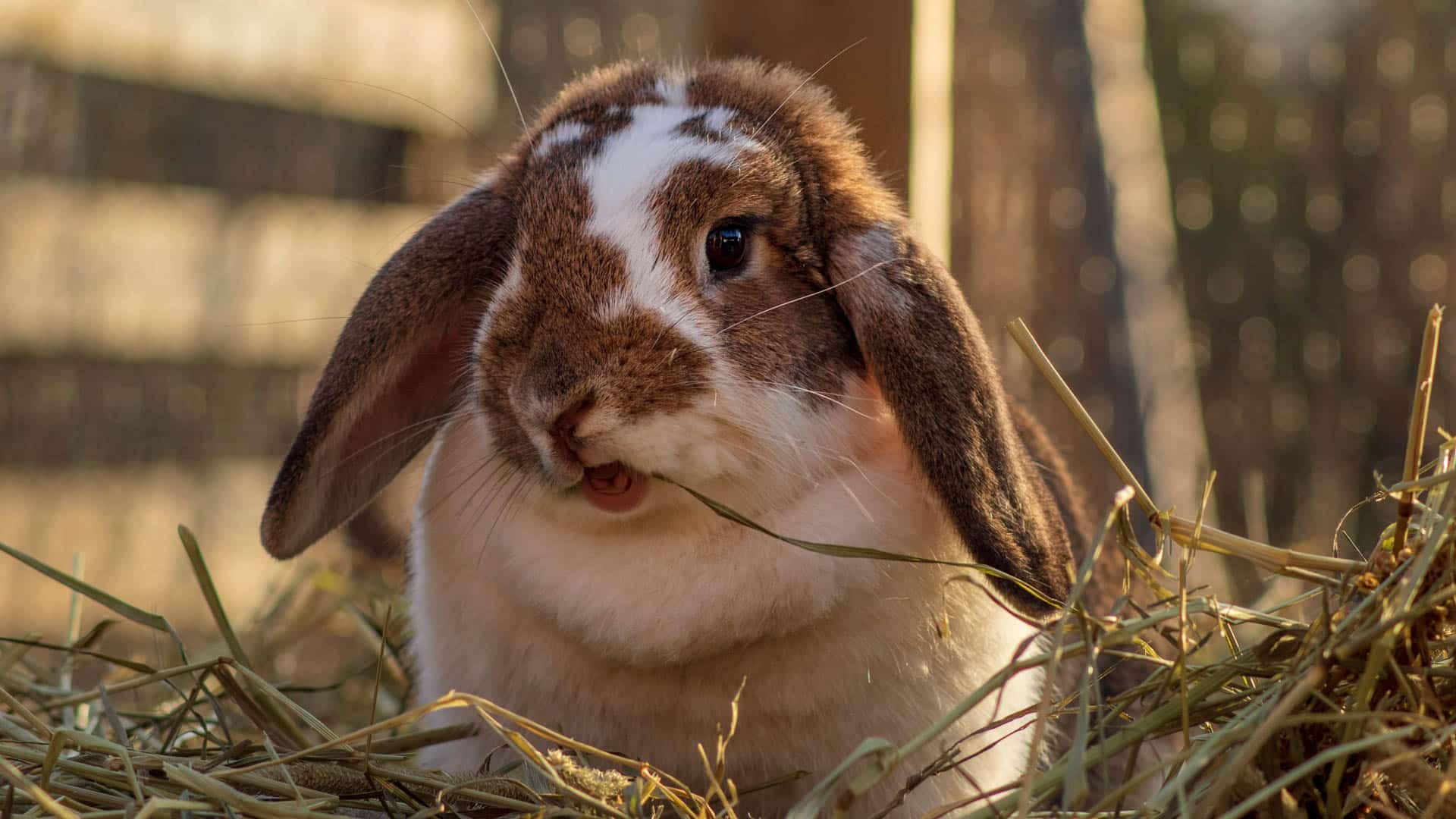
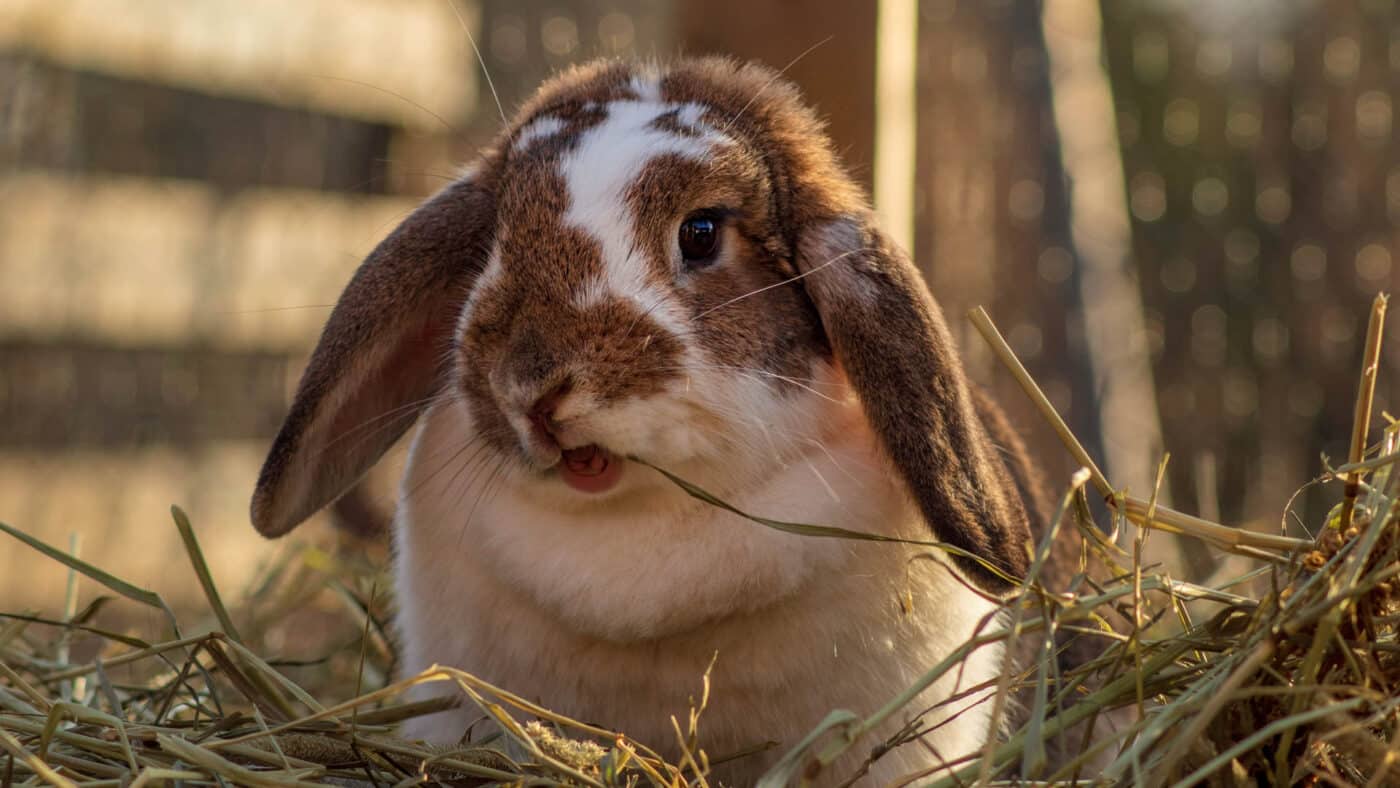
Of course, you want to provide your rabbit with the best possible nutrition, but we understand it can be confusing what kind of hay is best. Read this article to find out more about alfalfa hay and organic alfalfa hay.
While both conventional and organic alfalfa hay can be a good source of nutrients for rabbits, organic alfalfa hay offers even more benefits. This article dives into those benefits. But ultimately, keep in mind that alfalfa hay must be eaten in very limited amounts. If you already know what type of alfalfa you want, Blue Mountain Hay can provide you with high-quality options!
Alfalfa hay is a type of legume hay (as opposed to grass hay) that is high in protein, calcium, fiber, and other essential nutrients that rabbits need for optimal health. Rabbits are herbivores and require a diet that is high in fiber to maintain healthy digestion. Alfalfa hay is an excellent source of fiber and provides nutrients that help rabbits grow and maintain healthy teeth and bones. While there are benefits in eating alfalfa hay, grown rabbits should only be given small amounts since it is very high in calcium. Read on to find out more information.
Here is a helpful table comparing different types of hay and their nutritional properties. For more information, read this article from Blue Mountain Hay.
| Hay Type | Crude Fiber | Crude Protein | Calcium |
| Orchard Grass | 34% | 10% | 0.33% |
| Timothy | 32-34% | 8-11% | 0.4-0.6% |
| Oat | 31% | 10% | 0.4% |
| Dried Grass | 25-28% | 12-14% | 0.55% |
| Meadow | 33% | 7% | 0.6% |
| Alfalfa | 28-34% | 13-19% | 1.2-1.4% |
| Bermudagrass | 29% | 10% | 0.46% |
It is recommended that up to 90% of an adult rabbit’s diet is made up of grass hay, such as timothy hay, rather than alfalfa.
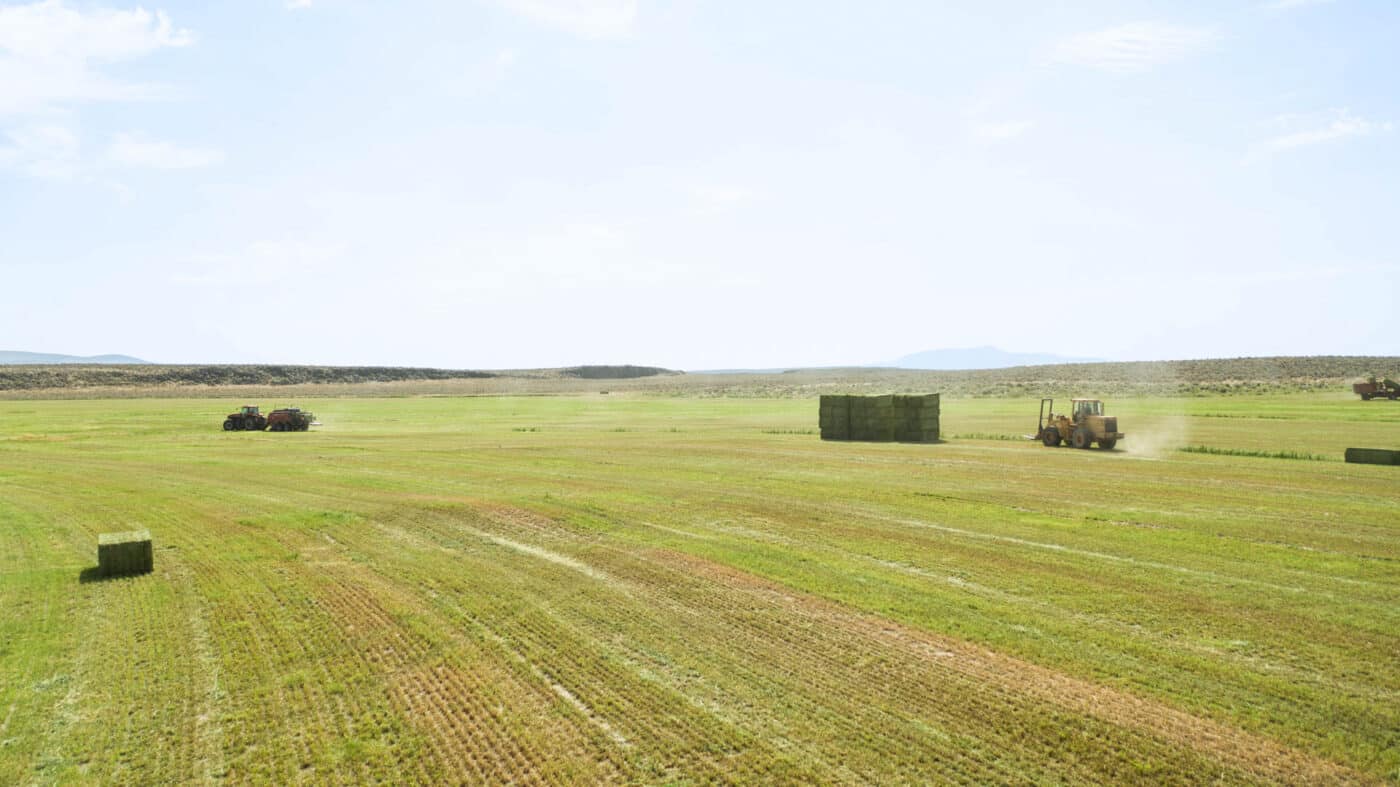
We recommend Organic alfalfa hay. In fact, Blue Mountain Hay offers a high-quality, affordable organic alfalfa hay option!
Why choose organic alfalfa? Organic alfalfa hay is grown without the use of synthetic fertilizers, pesticides, or other chemicals. Instead, organic farmers use natural methods to fertilize the soil and control pests, such as crop rotation, composting, and natural predators.
Organic farming methods result in higher quality and nutrient-dense hay. The healthier growing environment of organic alfalfa hay promotes the growth of beneficial microorganisms that aid in digestion. Organic alfalfa hay is also less likely to contain harmful chemicals or toxins that can cause health problems in rabbits. Additionally, organic farming practices have a positive impact on the environment, promoting healthy soil and biodiversity. Read our ultimate guide on hay for rabbits for an overview of other hay types.



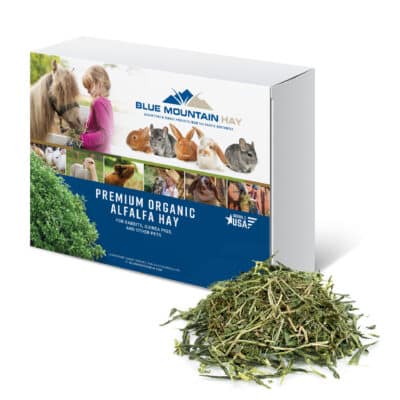
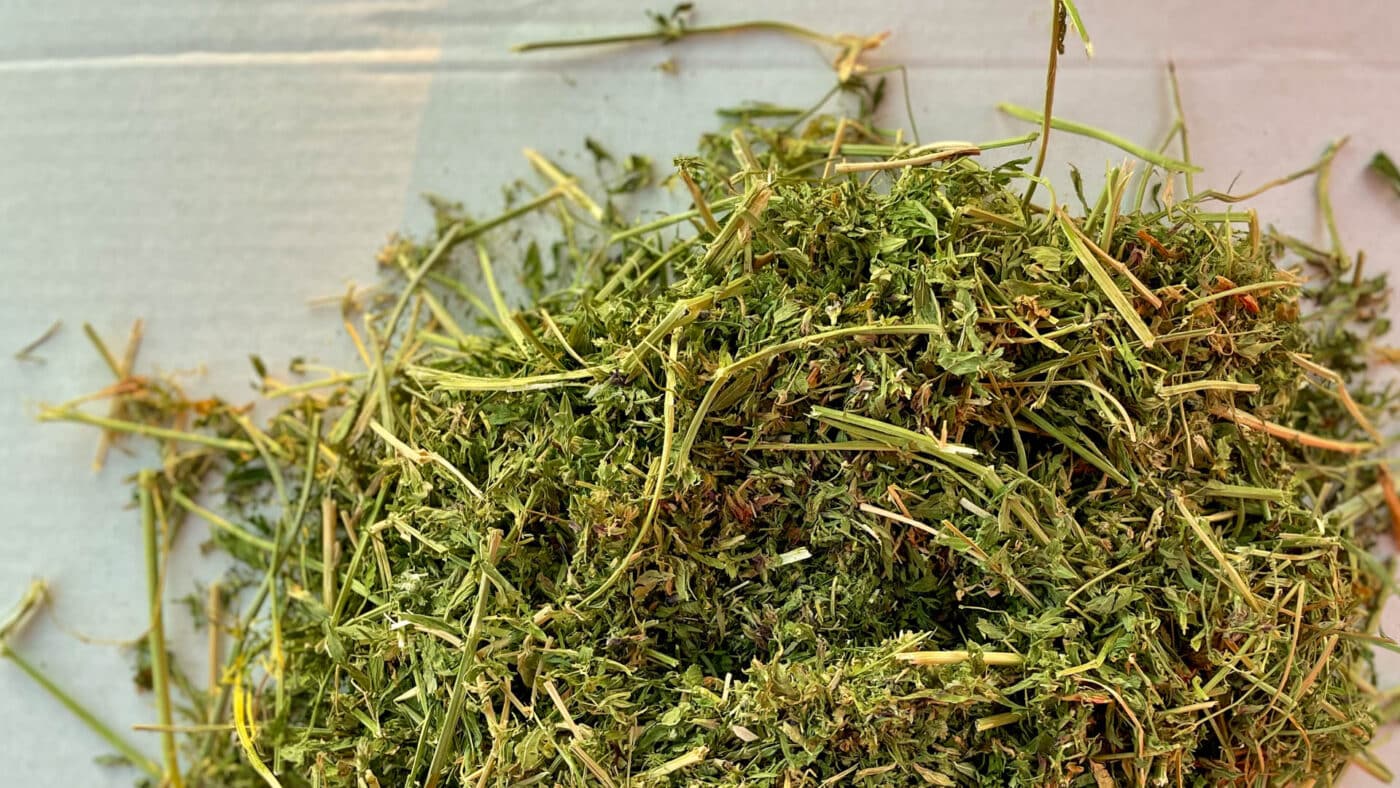
While rabbits can eat alfalfa hay every day, the amount and frequency will depend on the age and health of your rabbit. For adult rabbits, alfalfa hay is an addition, rather than a staple. And even for rabbits that need extra nutrition, such as pregnant or lactating rabbits, alfalfa hay is also an addition.
Because it is so dense specifically in protein and calcium, alfalfa hay can be very beneficial for very young rabbits (1-7 months), or rabbits that need extra nutrition. But as they grow older, they may need a more balanced diet that includes other types of hay (grass hay), such as Blue Mountain Timothy Hay or Blue Mountain Organic Oat Hay (learn about organic oat hay for rabbits).
It is recommended that adult rabbits have a diet of up to 90% grass hay (rather than alfalfa, a legume hay).
In fact, it can be dangerous to give too much alfalfa to adult rabbits. The extra calcium may become too concentrated in their system giving them painful and possibly fatal stones.
Feeding alfalfa to adult rabbits is ill-advised, as a primary diet. Rabbits absorb calcium from food and eliminate excess via their urogenital system. Uroliths (urinary bladder stones) can be associated with high-calcium diets. This association with urinary bladder stones is not definitive, however. For more information, consider reading this resource.
That being said, alfalfa hay can be used well for adult rabbits as treats, to encourage eating in picky rabbits, and to help provide nutrients to malnourished or sick rabbits. Consult with your veterinarian to determine the appropriate feeding schedule and amount for your rabbit.
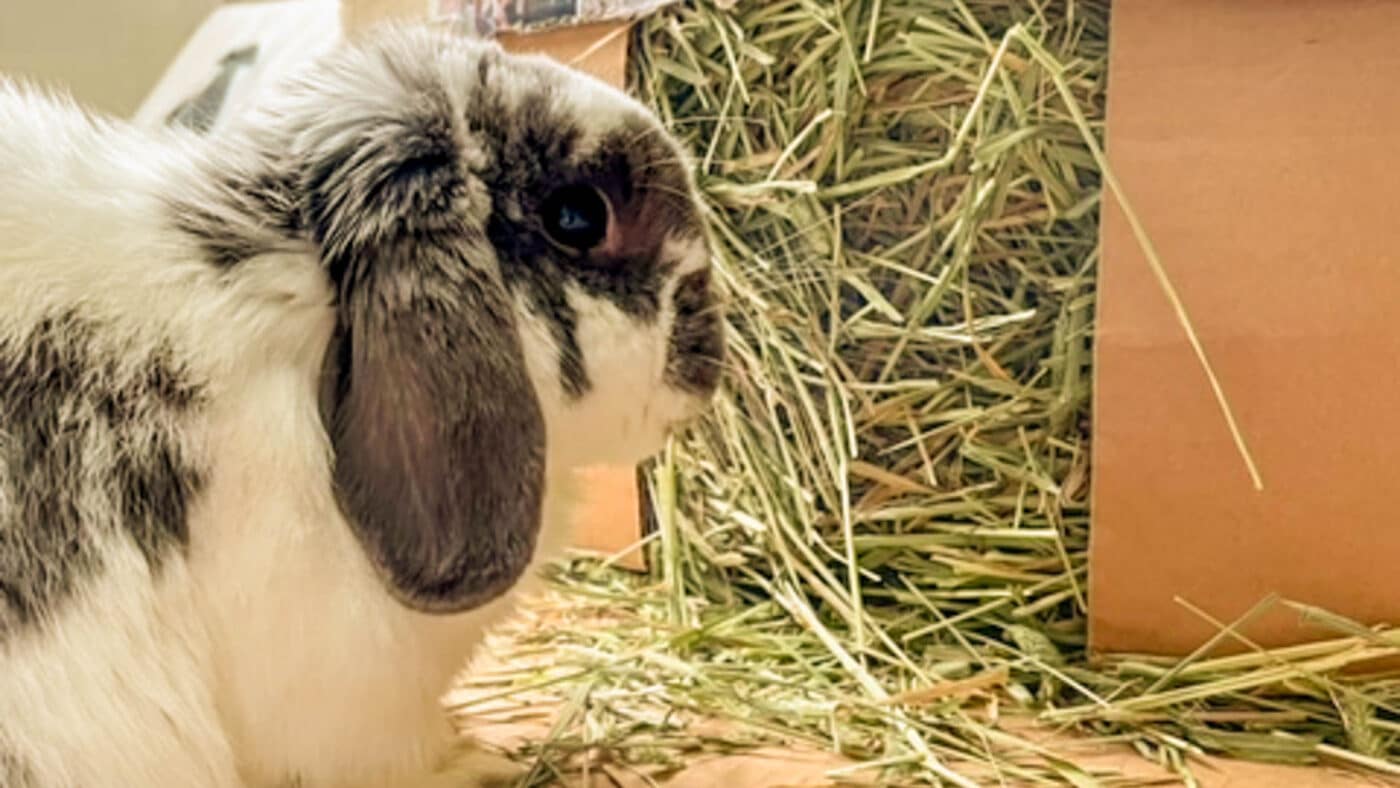
Conventional Alfalfa Hay can actually be more expensive at times than Organic Alfalfa Hay because of the fertilizer costs that must be used (such as is the case with Blue Mountain Hay). At times conventional could be more cost effective than organic, but even then, it is worth the investment for the health of your rabbit.
Choosing organic alfalfa hay can help prevent health problems associated with conventional hay, such as respiratory issues and GI stasis. When selecting hay for your rabbit, consider Blue Mountain Hay for high-quality organic and conventional alfalfa hay options!




Blue Mountain alfalfa hays are a good source of protein and calcium for rabbits. Feeding your rabbit Organic Alfalfa hay can offer many benefits, including improved nutrition, better digestion, reduced risk of health problems, and a positive impact on the environment (see our in-depth hay guide for small pets). For adult rabbits, Blue Mountain offers other hays that are a better source of fiber, such as Timothy or Organic Oat Hay. Using several different kinds of hay can provide a balanced diet that meets their nutritional needs. To learn more about Timothy Hay for rabbits read this article.
While conventional alfalfa hay can be a good source of nutrients for rabbits, choosing organic alfalfa hay or organic oat hay is a better option for most rabbit owners. If you’re curious, we also have information on hay for chinchillas. Check out our high quality, affordable organic hays or even our organic bedding (e.g. straw works as a great bedding in cat shelters)! Educate yourself on RHDV2 in rabbits today, through our seasoned veterinarian.
Interested in hearing about some of our other products? Take a look at our organic garden straw for your garden or our organic litter pellets for small animals.

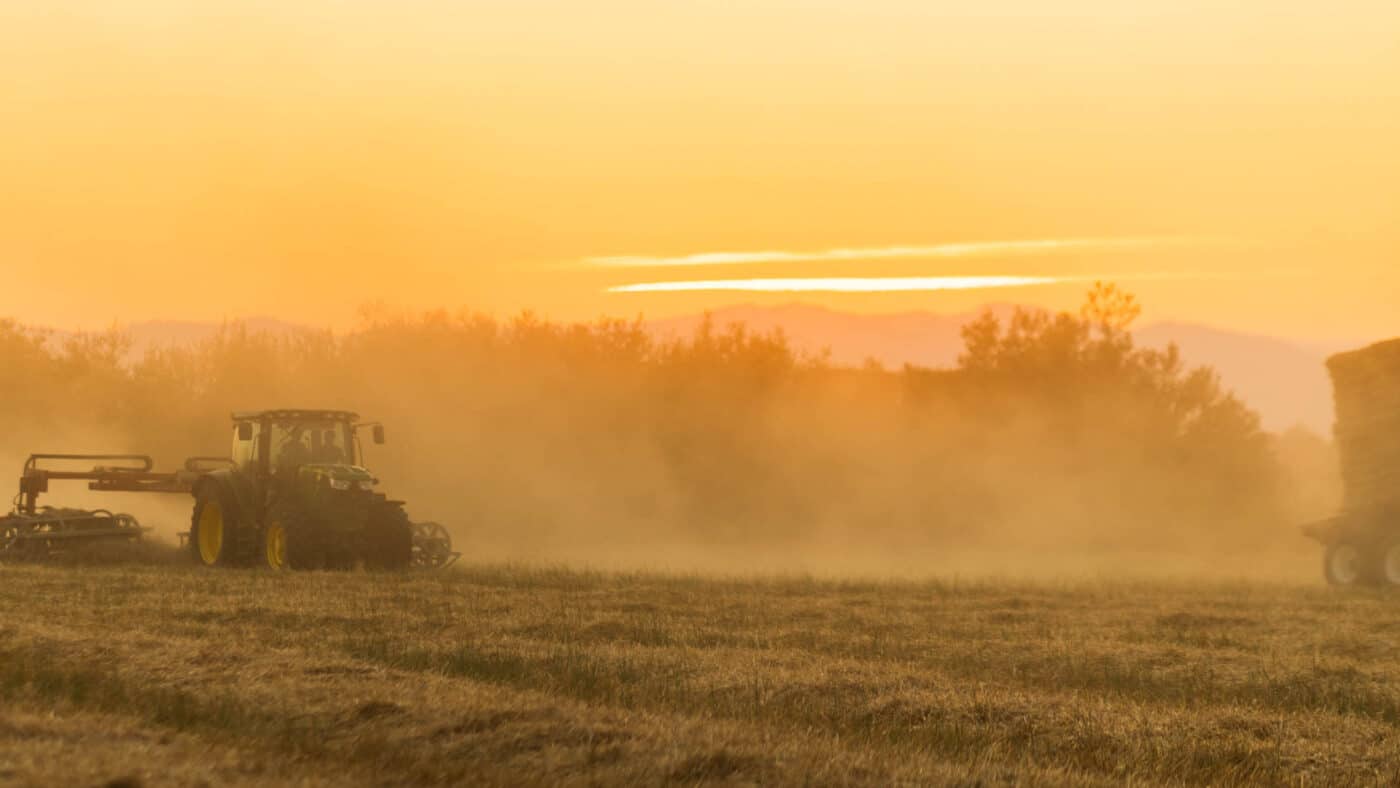
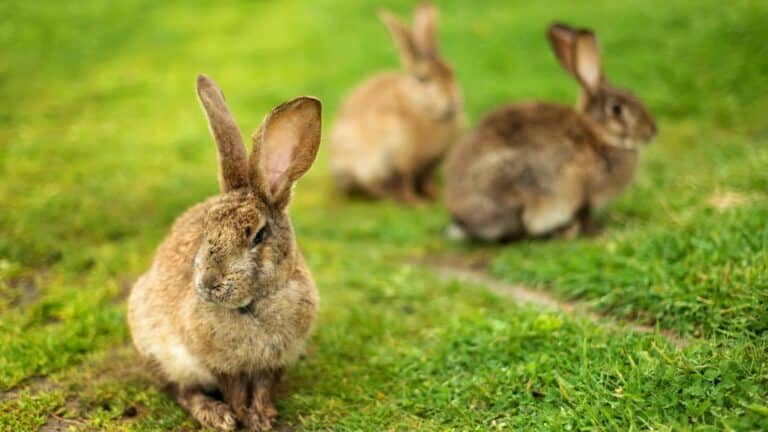
Got questions about which hay options are best for your pet rabbit? You’ve come to the right spot!
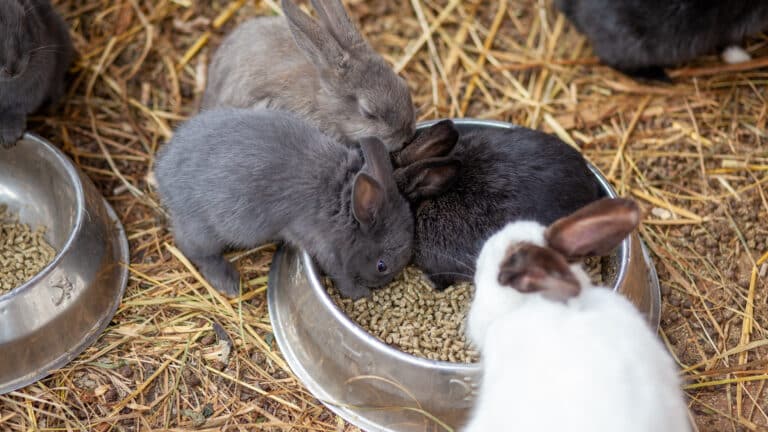
Don’t allow yourself to be ignorant about RHDV2. Read this article for more information!
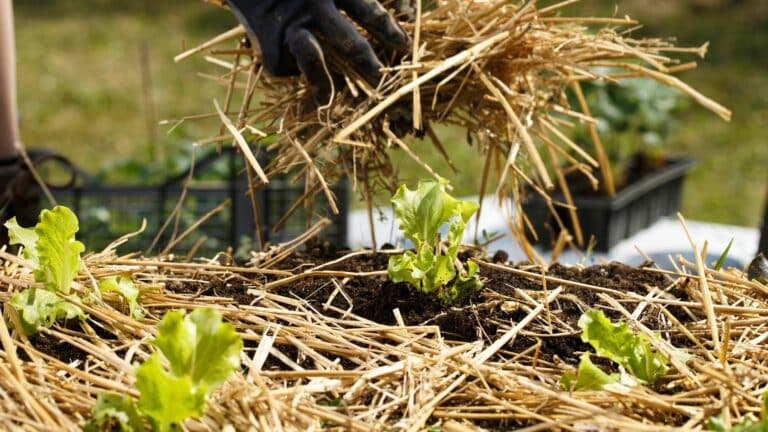
Keep your plants cozy and safe this winter! Read our article on the many advantages of straw mulch during the winter months and how you can effectively use straw.